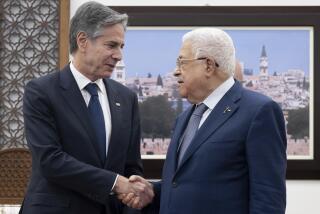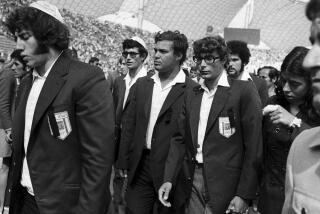Mideast Peace Outlook Is Dim, Panel Has Found
- Share via
JERUSALEM — A U.S.-appointed international team investigating six months of Mideast bloodshed was winding up its work Sunday discouraged at the utter lack of common ground between Israelis and Palestinians and the dim prospects for any reconciliation.
The team, led by former U.S. Sen. George J. Mitchell of Maine, has found the two sides deeply entrenched in positions that have only hardened since the group’s work began, sources said. Mitchell’s committee is assigned to explore the causes of violence that has claimed more than 420 lives since late September and to recommend how to stop it and revive peace talks.
It is a formidable task, some of those involved said Sunday. Nothing the committee recommends can be expected to satisfy the two sides.
Mitchell and other committee members met Sunday with Israeli Prime Minister Ariel Sharon, who offered to cooperate but also made clear his opposition to the endeavor.
Creation of the committee, Sharon told national radio, was “a historic mistake.”
“No one has the right--no one--to put Israel to a world trial,” Sharon said shortly before receiving Mitchell and his entourage.
Mitchell’s response: “We are not a tribunal. We do not believe that anyone is on trial.”
Israel--under former Prime Minister Ehud Barak--accepted appointment of the Mitchell committee only begrudgingly and only after assurances that its mandate would be limited. The “fact-finding” panel was named by then-President Clinton at an emergency summit in the Egyptian resort of Sharm el Sheik in October, part of a series of measures aimed at preventing Israeli-Palestinian unrest from spiraling out of control.
Israel complains that none of the other measures promised at Sharm el Sheik, such as that the Palestinians would rein in gunmen, have been fulfilled.
If the Israelis were reluctant to receive the fact-finding mission, the Palestinians were eager, hoping to use the committee as a platform to promote their call for international peacekeepers to be deployed in the West Bank and Gaza Strip.
With nearly all of the fieldwork concluded, Mitchell said Sunday that he expects to present his final report at the end of April.
In Sunday’s meeting, Sharon lectured committee members on who should be blamed exclusively for the violence: Palestinian Authority President Yasser Arafat, who, the prime minister said, made a “strategic decision” to resort to shootings and bombings long before Sharon’s own visit to a disputed holy site sparked rioting in September.
Sharon told the group that its efforts to be “balanced” will only reward terrorism.
The Palestinians urged Mitchell to point the finger of blame at Israel.
“Your investigation cannot simply be a question of what, it must also be a question of why,” Palestinian Information Minister Yasser Abed-Rabbo told the committee as it wrapped up its work in the West Bank late last week.
Israel points to Palestinian incitement, the stockpiling of weapons and the formation of militias as evidence of Arafat’s rejection of peace. Palestinians blame the violence on Israel’s occupation of parts of the West Bank and Gaza Strip, the brisk pace of Jewish settlement expansion, and blockades that have cut off most Palestinians and devastated the Palestinian economy.
Both sides have submitted reams of documents, position papers, videos and accusations to Mitchell’s five-member team.
The members heard from Israeli victims, including the widow of a doctor killed as he drove home to a settlement south of Jerusalem, and the father of a 16-year-old boy lured to his death by messages on his computer. They also heard from Palestinian victims, including the widower of a 45-year-old woman and the mother of a 9-year-old boy, both killed in or near their homes by Israeli gunfire from a nearby settlement.
They toured Gaza, where they saw Israeli army bulldozers biting into Palestinian land and Palestinian youths throwing stones at Israelis.
In all of the arguments and interviews, Palestinians and Israelis were diametrically opposed on what has happened--and why--a source close to the committee said. “Every single contention of one side was contradicted by the other side,” the source said. “They were mirror images of each other.”
Although human rights organizations and U.N. agencies have conducted other probes into the violence here, only the Mitchell commission--which includes a former president of Turkey and the foreign policy chief of the European Union--has the kind of hefty U.S. backing that might make its recommendations more palatable to Israel.
More to Read
Sign up for Essential California
The most important California stories and recommendations in your inbox every morning.
You may occasionally receive promotional content from the Los Angeles Times.














